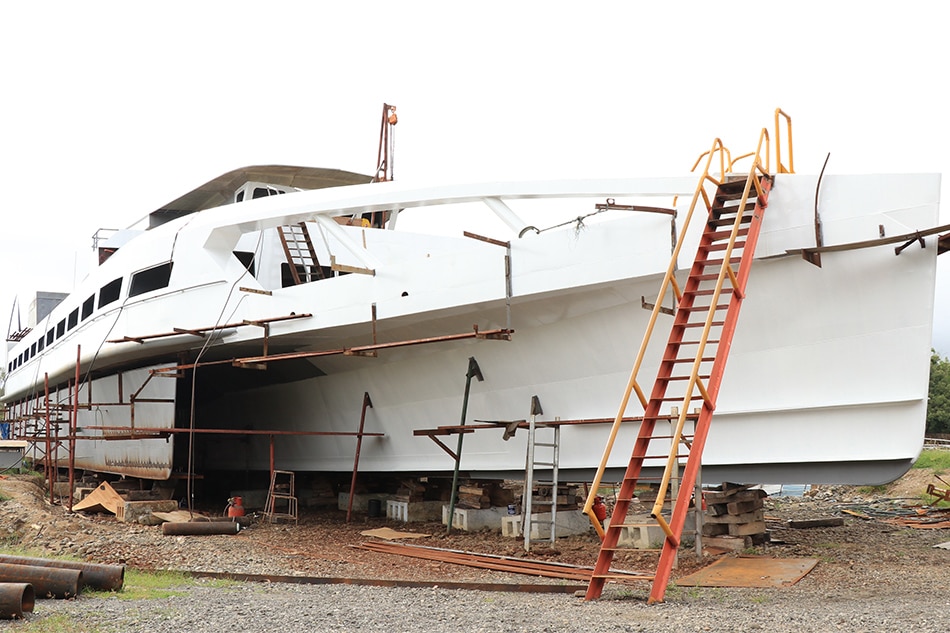You are here
DOST touts developing world's first cargo boat powered by ocean waves
LOOK: DOST touts developing world's first cargo boat powered by ocean waves
Kristine Sabillo, Mar 03 2020 https://news.abs-cbn.com/spotlight/03/03/20/look-dost-touts-developing-w...
The Department of Science and Technology is funding the construction of a hybrid trimaran partly powered by ocean wave energy. It is expected to be finished before the year ends. DOST-PCIEERD.
MANILA—In about half a year, the world will be seeing its first ocean wave-powered boat, a hybrid trimaran currently being built in Aklan.
During a media event last month, Department of Science and Technology (DOST) Secretary Fortunato de la Peña said it is “environment-friendly, safe and unsinkable.”
The fast sea craft, which can carry 100 passengers, 4 vans and up to 15 motorcycles, is being built by Metallica Shipyard with the support of the DOST’s Philippine Council for Industry, Energy, and Emerging Technology Research and Development (PCIEERD), the Aklan State University and the Maritime Industry Authority (Marina).
“This is a hybrid (boat) so when it operates it will use wave energy, which will reduce the requirement for fuel,” De la Peña said.
Engineer Jonathan Salvador, owner of Metallica Shipyard, told ABS-CBN News that they are still working on the fabrication of what will be the world’s first wave-powered trimaran vessel.
“There were delays due to the storm (Ursula) but we can manage a ‘Good to Go sign!’ before the end of this 3rd quarter,” he told ABS-CBN News.
Salvador said that while modern trimarans are now widely used and there are wave-powered boats already, this would be the first hybrid trimaran that is partly powered by ocean waves.
“In the whole world, we’ll be the first to use wave energy for a trimaran,” he said. “What we are doing now is a prototype . . . We are marking it standardized.”
The hybrid trimaran, a fast-sailing multi-hulled boat, is environment-friendly for three reasons. The first is its use of wave energy double action hydraulic pumps, which will be integrated in the outriggers of the hybrid craft.
“The mechanical movements in the pumps will be converted to electrical energy that can be used to provide additional power to the vessel,” a DOST release said. “The more waves that the vessel encounters, more power will be produced. This technology is expected to improve the vessel’s energy efficiency, making it not only cost-efficient, but also environment-friendly.”
And because the vessel is fast-sailing, it can transport passengers in half the time a normal boat takes. Salvador said this means the vessel will not accumulate a large amount of trash since a short ride will only require passengers to eat a snack instead of a full meal.
He said some boat operators end up throwing their trash in the sea because they don’t want to declare it at the port and pay for the necessary disposal cost.
Empty bottles of softdrinks are also recycled and incorporated in the frame of the vessel.
Salvador, a marine engineer who has worked in the industry for more than 3 decades, said he started the project because he wanted to keep the environment, specifically the seas, clean, especially since the Philippines is surrounded by water.
“Our garbage generation is terrible. Everything goes to the sea,” he said.
The DOST is hoping that the hybrid trimaran will be able to change the roll-on roll-off (RORO) shipping industry.
Ocean waves are among the cleanest renewable sources of energy. It is utilized by devices or machinery that captures the natural movement of the ocean to generate power.
Salvador explained that the trimaran is virtually unsinkable because it is wider and therefore harder to capsize. He said it is basically like three boats attached to each other.
The marine engineer said he is already looking forward to his next project, a larger vessel powered by garbage.

